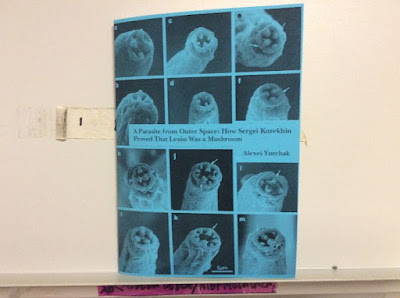“Enlarging the discourse on art was one of the most important ideas when I started the critical journal Diatxt. In 2000. In the sixth volume of the journal title "Parasite Paradise", I interviewed Dr. Koichiro Fujita. Dr. Fujita was then a professor at the graduate department of Environmental Parasitology at Tokyo Medical and Dental University, since 1987. His speciality is parasitology and infection immunology. Besides his academic achievements, he has written many books for general readers. There he argues for a better relationship between humans and parasites, and humans and pets. He has warned of the dangers of people obsessed with cleaniness in Japan, an obsession driven by a wide range of industries. “
“Before modern times, there was a deep symbiotic relation between roundworms and people in Japan. In the Edo period, people thought it normal to be infected by parasites, no matter what the authorities might think. Leyasu Tokugawa, the first Shogun of the Edo Period, promoted the immigration of seventy hundred thousand people to the region that is today’s Tokyo, and he tried to establish a self-sufficient food production system. But the land was not fertile enough to supply food to such a large population. So the Shogun decided to fertilize the soil by using excrement. Thus, in the Edo period, waste from the human body became one of the most important items of distribution. It was even called “Kim-p” (gold manure). Naturally, in this system, roundworms infected many people. They tried to reduce the chance of infection by keeping excreta in receptables. During the natural process of fermentation, the heat produced kills eggs of roudworms. There were many other methods, but none of them led to complete extermination. People at that time allowed parasites to enter their body, thinking, “well, it’s OK, if its not too many”.(..)
“In the globalizing industrial society, art and culture are sometimes treated as less important, or even “parasitic” acitivities because they don’t directly contribute to prosperity. What has happened under the name of “university reformation” in Japan for the last two decades is the introduction of market principles into academic institutions. As the result, technology and business have been dramatically reinforced while humanities have been “restructured” in many universities. It is a pity. The most serious influence of this “reformation”, however, is the standardization of any kind of academic knowledge according to the productivity model of technology. That’s why we, those who work on art and culture, have to develop “parasitic” strategies, I think. There is nothing shamefull about being a parasite, as every life is more or less parasitic. “
Hiroshi Yoshioka (in Interface Cultures: Artistic Aspects of Interaction 2008)
In 2014 Hiroshi Yoshioka was also editor in chief of the semi official para-zine as part of "Parasophia" at the Kyoto International Festival of Contemporary Culture :
“Parasophia, the newspaper isn’t focused on advertising the exhibition. In that sense, Parazine is “semi-official,” and you could say that it’s basically a “parasite” living off of Parasophia. We help our host by spreading the word, and in return, we get to do what we want. Even though we don’t directly advertise the exhibition, the fact that they are allowing us this degree of freedom publicly demonstrates Parasophia’s open-mindedness, and I think that in the end this is the best publicity for Parasophia.” http://www.parasophia.jp/en/get_involved/
#cultural_parasitology #synchronicity_of_parasites #synchronicityofparasite #parasite_zinelibrary #occidental_parasitology































